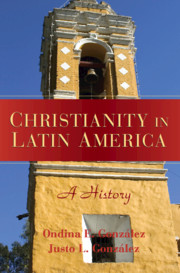Book contents
- Frontmatter
- Contents
- Preface
- Introduction
- 1 Foundations
- 2 The Arrival of Christianity
- 3 The Shaping of the Faith
- 4 Reform Movements
- 5 The Church in Turmoil
- 6 The Church's New Place
- 7 Protestant Immigration
- 8 An Expanding Protestant Presence
- 9 Catholicism after Vatican II
- 10 Pentecostalism and Autochthonous Movements
- 11 By Way of Conclusion
- Some Suggestions for Further Reading
- Sources Referenced
- Index
8 - An Expanding Protestant Presence
Published online by Cambridge University Press: 05 June 2012
- Frontmatter
- Contents
- Preface
- Introduction
- 1 Foundations
- 2 The Arrival of Christianity
- 3 The Shaping of the Faith
- 4 Reform Movements
- 5 The Church in Turmoil
- 6 The Church's New Place
- 7 Protestant Immigration
- 8 An Expanding Protestant Presence
- 9 Catholicism after Vatican II
- 10 Pentecostalism and Autochthonous Movements
- 11 By Way of Conclusion
- Some Suggestions for Further Reading
- Sources Referenced
- Index
Summary
The new conditions that created so many problems for the Roman Catholic Church after independence (Chapter 5) and led to the promotion of immigration from Protestant nations (Chapter 7) also opened the way for the first Protestant missionaries. Liberal governments seeking to counterbalance the influence of the Catholic Church and conservative elements saw in Protestantism a tool for their own political ends. Thus they accepted, and sometimes even promoted and invited, not only Protestant immigrants but also the presence of Protestant missionaries in the hope that their work would undermine conservatism. The political leaders who thus contributed to Protestant penetration into Latin America had no inclination to become Protestants themselves – in fact, most remained active within the Catholic Church, even though in constant tension with its hierarchy.
The very process of independence and its aftermath had also awakened interest in Latin America first in Great Britain, and then in the United States. In Great Britain, the Latin American wars of independence were seen as a valiant struggle against the obscurantism and totalitarian tendencies of Spain, and therefore a number of Britons – including some aristocratic and rich adventurers – crossed the Atlantic in order to join the insurgent armies. In the United States, that nation's own struggle for independence was the window through which many looked at various similar struggles in Latin America. And this sentiment was also reflected among many of the Latin American insurgents, who eventually promulgated constitutions patterned after the Constitution of the United States.
- Type
- Chapter
- Information
- Christianity in Latin AmericaA History, pp. 206 - 239Publisher: Cambridge University PressPrint publication year: 2007



